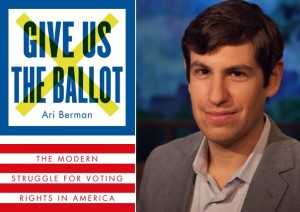I’m Sorry, Dr. King. I’m So Sorry.
There’s a book: Give Us The Ballot, by Ari Berman. Berman writes a lot for The Nation magazine.
 I was going to review Give Us The Ballot for Dr. King Day when it came out a few years back.
I was going to review Give Us The Ballot for Dr. King Day when it came out a few years back.
But I couldn’t, and still can’t. I can’t bear to. It’s too awful. I’m Sorry, Ari. I’m sorry, Dr. King.
But wait — I don’t mean Give Us The Ballot is an awful book. It received many accolades, and surely deserved them. And the part I read was well-written, and it’s clear Berman researched the hell out of the subject.
In fact, Berman’s book is a fitting counterpart to my book, Selma 1965: The March that Changed The South. He even cites mine a couple times. As a writer, I have no complaints with Berman’s work.
 But that’s the thing. I only read one chapter: the last. It’s called “After Shelby.” I could just barely get through it, even though I’m in it (not named, but still).
But that’s the thing. I only read one chapter: the last. It’s called “After Shelby.” I could just barely get through it, even though I’m in it (not named, but still).
Why? My book shows how the Voting Rights act of 1965 was made possible. Berman’s book tells how the Voting Rights Act was destroyed.
“Shelby” (as in, Shelby County, Alabama) is the June 2013 Supreme Court decision that cut the heart out of the Voting Rights Act of 1965. Berman shows in careful detail how this decision came about. (I didn’t read those parts, but I know they’re there.)
The last chapter is about good ole NC and the NAACP’s Rev. William Barber and the Moral Monday protests in 2013. I was one of nearly a thousand who got arrested in that classically nonviolent “uprising,” and weren’t those the Good Old Days??
Well, yeah, but not near good enough, if you know what I mean. The NC legislature, like many others, dominated by rightwing Republicans (there used to be other kinds), ignored us and still rushed through the door to mass voter suppression that Shelby opened. Berman’s chapter follows how that was done, and closes with the new vote suppression working so well that Thom (ugh) Tillis, who helped ram it through, got elected to the U.S. Senate by just about the margin of votes that can be shown to have been newly suppressed. Tillis is up for re-election in 2020.
Of course, the program has been ramped up in preparation for the 2016 races, with Voter ID and lots more. Court fights continue, and restrictive laws and practices proliferate.
Berman quotes former Democratic State Representative Rick Glazier saying that the day the vote suppression program was rammed through the NC legislature was “the most emotional two hours I’ve ever spent in public office. This was, for many of our members, a feeling that their life’s work was being rolled back in one two hour session.”
Glazier was a fine, dedicated, broad-minded legislator. A year later he resigned in despair.

One of those members he was talking about was the late representative Mickey Michaux, a black lawyer from Durham, then 85 and the longest-serving member of the NC House.
“I want you to understand why this means so much to so many people,” he said to the majority. . . . “Now you’re putting back what many of us fought our lives and gave our lives for . . . . Forget all the gains of the 20th century. That’s what you’re doing with this bill . . . .I would ask you to take this abomination and confine it to the streets of hell for the rest of eternity.”
Of course they didn’t. Two hours, wham-bam-thank-you, boy.
And maybe that’s why Berman’s book was so hard for me to read: because it tells the story about how what Dr. King and all the folks in Selma, and with me tagging along as a rookie, got built fifty years ago, with blood and suffering and all that (tho besides three arrests I personally had it pretty easy), was brought tumbling down around us.
It’s traumatic. And personal.
I guess this shows that I was raised on the American myth of “Progress”: when things are bad, with striving and suffering, we can make them better. That’s how my book originally ended: upbeat. (I’ve updated it since, showing how the destruction of black gains has been carried out in Alabama; as bad as NC, maybe worse. But even so. “Progress” dies hard.)
So this big chunk of my life shows instead that what went up in ’65 could be brought down; and it was. That’s how it goes; I hear the echoes of that original wiseass, Mr. Ecclesiastes of the Bible:
“Dude, Didn’t I tell you?? The race ain’t always to the swift.”
Yeah, he told me; I thought we’d beaten the odds, tho.
But what goes around comes around; and like that momentarily wise failed 2016 presidential candidate Jeb? Bush said so well, (pardon my French), “Gee, Stuff Happens.”
And part of what makes this particular “stuff happening” so hard is part of what I know about Selma back then: the movement that began in January of ’65 wasn’t just a lark Dr. King set off on for a winter’s fun. It was the culmination of sixty-four years (that’s three generations!) of official legal black voter exclusion, with all the degradation, oppression and violence that regime enabled.
And while Berman is too smart to make predictions (as is the Rev. Barber) about all this suppression being soon reversed and the Voting Rights Act resurrected, we’re in another election year, during which we’re supposed to put on a game face and go all out. Again. But instead, here’s what swims into view when I gaze into my cracked crystal ball: we could also be facing another long road of trouble which I’m unlikely to see an end of.
I think it still looked at least somewhat different to Dr. King, more hopeful, even when he stepped out on that fatal Memphis motel balcony in April 1968.
Maybe. But now? Everybody’s supposed to celebrate today. But I can’t do it. And I can’t even finish or do justice to Ari Berman’s book.
I’m sorry, Ari. I’m sorry, Dr. King.

Thank you for reminding us of the 1965 Voting Rights . Good that you could not read the book…Isn’t this perhaps a good time to invite the subject back as priority starting on MLK 2017?
I am inspired to join with you.